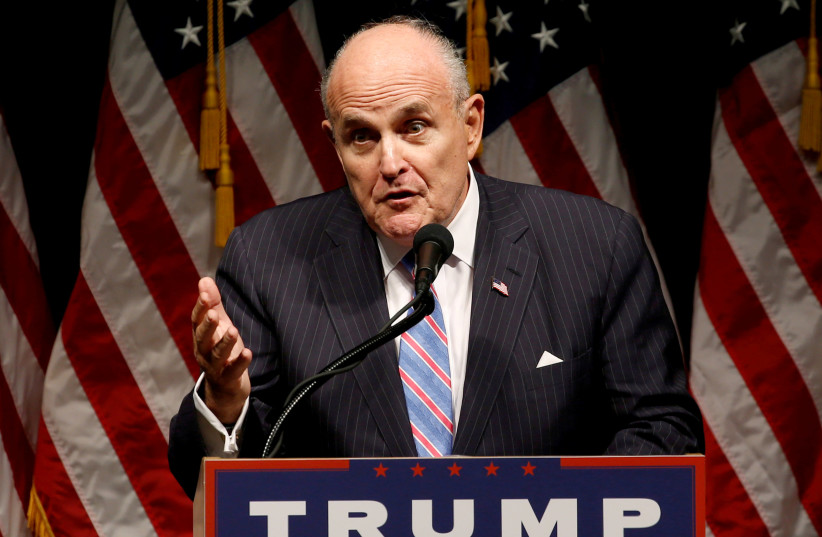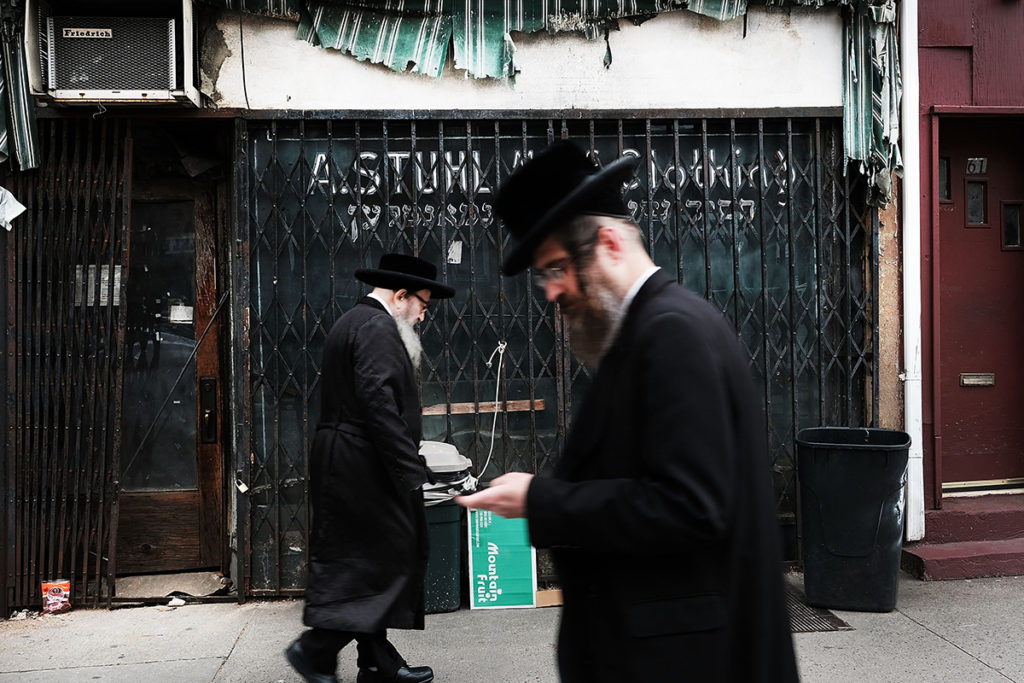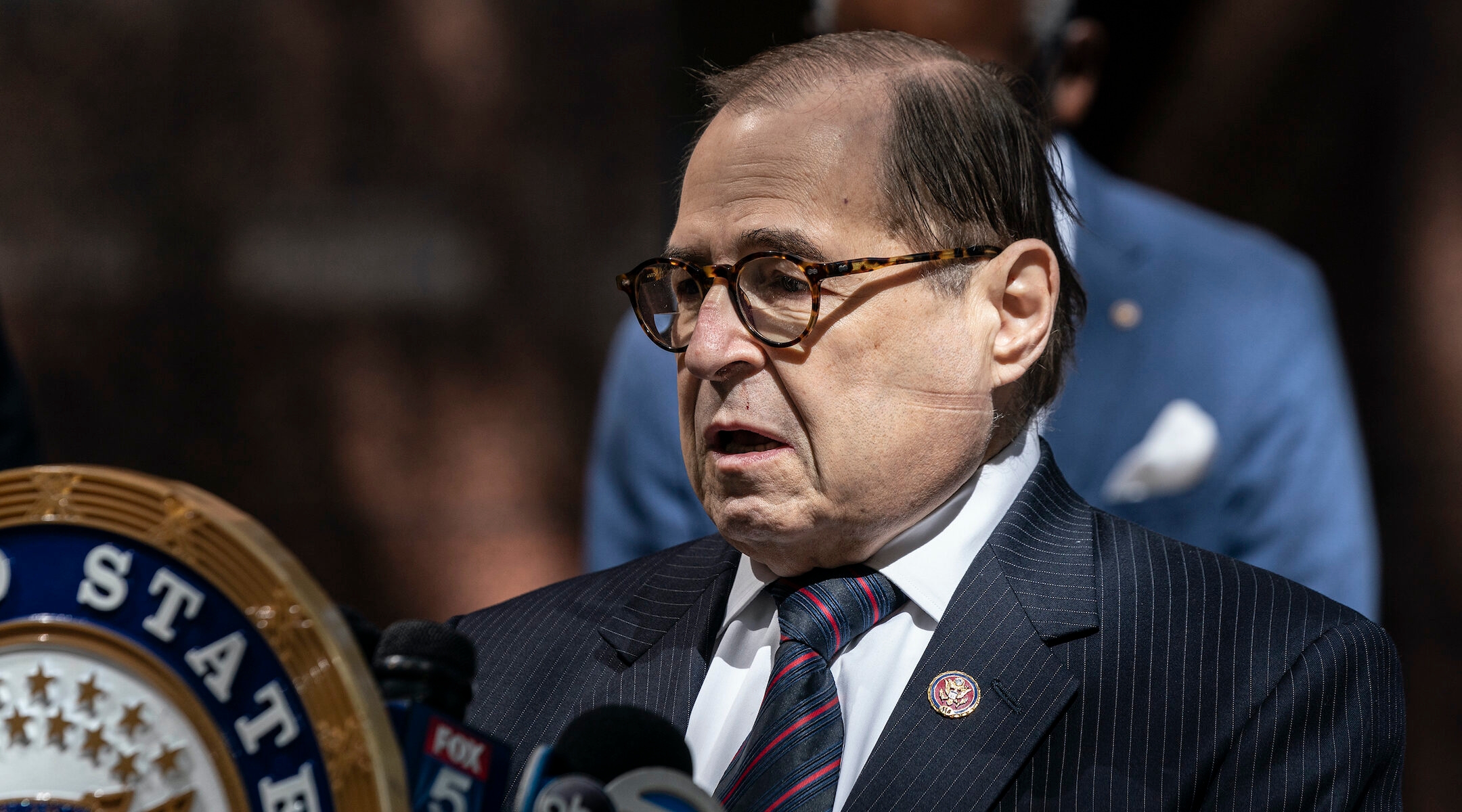Trump refuses to pay Giuliani for failed attempt to overturn election
In addition to blocking the payments owed to Giuliani, White House aides were also ordered not to field calls from him.



On January 6, 2021, Orthodox Jewish Trump supporters headed to the U.S. Capitol to join throngs of Proud Boys and QAnon conspiracy theorists to protest, and ultimately try to derail, President-elect Joe Biden’s legitimate presidential victory. As JTA reports, some Orthodox Trump supporters, including provocative leader Heshy Tischler, attempted to join the storming of the Capitol, but could not get in. JTA says that Tischler has since denounced the violence, but does not denounce the crusade behind it. Others, like Aaron Mostofsky, son of an Orthodox judge in Brooklyn, did get in, entering the Capitol building in riot gear, for which he has since been arrested.
Watching this all unfold, I was overwhelmed by fear as religious Jews attacked the Capitol alongside neo-Nazis. I felt my country dying by the hands of bigoted insurrectionists. I felt my religion and culture disintegrating in the hands of President Donald Trump. My fear was most palpable when a photograph of a bearded man in a “Camp Auschwitz” sweatshirt popped up on my Facebook feed. The front of his sweatshirt said, “Work brings freedom,” — a rough translation of “Arbeit Macht Frei,” the German phrase that famously appears at the entrance to Auschwitz — and the back said, “Staff.” It is seemingly unfathomable that many of the Orthodox and ultra-Orthodox people I was raised alongside support the same cause he supports. My grandmother, whose family was gassed and cremated in the Auschwitz-Birkenau compound, would be ashamed if she were alive to see that her brethren march alongside neo-Nazis.
I feel this shame deeply myself. I am ashamed that members of the Orthodox communities — communities that brought me into the world — have linked arms with those who would love for nothing more than to annihilate our people. I am ashamed that members of my Hasidic family would choose loyalty for Trump over religious and moral righteousness. I am ashamed, but I am not surprised.
My entire family is Hasidic. My parents, four siblings, 14 nieces and nephews, 20 uncles and aunts, and nearly 100 first cousins abide by Hasidic law. I am the black sheep — the one who left the Hasidic faith when I was 17 years old. However, while I am no longer Hasidic, I have a stake in the Hasidic community. My family is there to stay, and so I care about what transpires on the streets of Hasidic Brooklyn.
I also feel somewhat responsible for how they act. I feel somewhat responsible for every racist, sexist, and irrationally devoted pro-Trump comment that members of the community espouse. I know that in some ways, it is unreasonable to hold myself accountable for the actions of people I cannot control. But on the other hand, those who live as proud Hasids and those like me who have left the Hasidic community know that these people are our people.
Because they are my people, I cared when hundreds of Hasidic people, including members of my family, gathered on Brooklyn streets to burn masks in October 2020. I cared when far-right demagogue Tischler led these mass-mask burnings while proudly donning Trump insignia on his shirt. I cared when Tischler incited Hasidic people to attack journalist Jacob Kornbluh for doing his job and for promoting public health measures. I cared when 80% of New York Assembly District 48, the district that includes Borough Park and is overwhelmingly Hasidic, voted for Trump in the 2020 election.
And I definitely cared when these activities led to some Hasidic support for the January 6 Capitol insurrection. This support can be seen in photographs and videos of Hasidic community members from Dr. Hannah Lebovitz’s Twitter account. One video includes a Hasid arguing in Yiddish that anyone not planning to attend the Capitol riot is a kofer (heretic). The same man was seen at the Capitol on January 6. Support for the rioting can also be found in screenshots from Orthodox WhatsApp groups organizing trips to the Capitol.
People ask me why I care about the actions of those I left behind, and why the fundamentalism I am no longer subjected to still gnaws at me. They ask me why I feel a deep sense of shame each time the New York Times writes about Borough Park, Tischler, and the Trump cult of personality that has overwhelmed Hasidic life.
I care because with each burned mask and MAGA hat, the Hasidic community replaces the positive memories from my youth with fire and animosity. Since I have left the Bobov sect, I have held onto the warm Shabbat dinners, the communal support, and the intense spirituality of routine traditions. I have fused my love for Yiddish, my heimish personality, my strong connections with my family, and my passion for heartfelt holiday celebrations with my non-Hasidic life. But still, shame eats away at my appreciation for Hasidic tradition. I am ashamed that many Hasidic people have devolved into racist fearmongers who proudly hang Trump flags across my hometown that I have walked past while visiting my family in Brooklyn.
The thing is, contemporary Hasidic sects are designed for authoritarian control. Each Hasidic sect, from Bobov to Viznitz to Satmar to Skver, are run by what is called a “grand rabbi.” These rabbis are demanding patriarchs. They expect women to wear particular shades of stockings, men to dress identically, congregants to receive their blessings before making any personal life decisions, and they believe in a world where Hasids are the only Jews worth mentioning. Most importantly, Hasidic grand rabbis center their congregants’ worlds around themselves. They are populist leaders of miniature nations. Congregants have paintings and photographs of grand rabbis around their homes, sacrifice family time for tisches (Friday night gatherings) with their leaders, and would do anything to protect the power of their particular grand rabbi.
Hasidic society was not always this way. Power struggles did not always regulate everyday Hasidic life. Authoritarianism was not always the dominating factor of these communities. But along with fears of assimilation came rabbinical dominance and populist rhetoric. Since contemporary Hasidic society is built on this hierarchical system, Hasidic congregants are particularly susceptible to Trump’s populist rhetoric. In some ways, Trump has become the ultimate grand rabbi, telling people what to think, how to act, and who to hate. Many Hasidic people are raised to conform. Individualism is antithetical to the insularity required by much of present-day Hasidic life. Many Hasidic sects demand a fear of the outside — a fear of anything and anyone that can disrupt the Hasidic equilibrium. Therefore, many Hasids are inclined to be swept away by the conformist, seemingly traditional, and authoritarian demands of a demagogue like Donald Trump.
According to Dr. Hannah Lebovitz and Beth Pikowski, Trump “made it comfortable and convenient for our predominantly white (Orthodox Jewish and evangelical Christian) communities to believe the real threat came from outside, either from the left—imagined as a vague group of lawless and godless people—or from those elsewhere who practiced a different religion.” Trump speaks to the darker features of Hasidic culture, especially some Hasidic people’s desires to highlight blood lineage and deny women’s rights, and proper education for Hasidic children, leading good Hasidic people down a treacherous fascistic path.
While Trump’s cult of personality appeals to many Hasidic people’s nurtured need for authority, it is not the entire story. Another reason why so many Hasidic people remain loyal to Trump’s messaging, even after the January 6 insurrection, is because of the inferior education standards in the Hasidic community. Hasidic schools are purposefully negligent when providing secular education to its children. Young Hasidic boys receive only 90 minutes of secular studies a day. When the boys are teenagers, most receive no secular education at all.
I can corroborate this from the secular education my own family receives. Most of the male teenagers in my family cannot write an essay. They see most non-white and non-Jewish people as the enemy. Their views on equality are formed by a Yehuda HaLevi framework, a structure that establishes Jews as superior to all other people. When Hasidic children are taught that they are superior in this way, they will likely become adults with far-right political tendencies. They will consider others beneath them. They will join political movements that thrive off racism and sexism.
We cannot expect Hasidic children to grow up with rational and individualistic thoughts on politics and socio-cultural issues if their educations deny them these thoughts. We cannot expect them to consider equal rights worth fighting for. With their inferior educations, they are perfect fodder for Trump’s cult-like authoritarian movement.
I want to be clear that not all Hasidic people have jumped on the Trump bandwagon. Not all of them have been blinded by promises of authoritarian insularity. There are members of the community, like my father, who are disgusted by the insurrection. They are disgusted by what Trump has done to our country. My father, a rational and moral man, loves Hasidism. In Hasidism, he sees the upside of loyalty and the kindheartedness of community. His heart breaks at what Trump has done to people’s integrity, and he is not alone.
Those of us inside and outside the Hasidic community need to band together. We need to dispel the Trump disease infecting our families and congregations. But more than that, we need to dismiss the authoritarian and patriarchal structures that made Trump’s popularity possible. We need to untangle the web of control that grand rabbis hold. Hasidic people need favorable education standards, the possibility of individuality, and the freedom to choose. Without these, the community will continue falling for the Trumps of the world. They will continue choosing vehemence over love, foolishness over rationality.

Jerry Nadler speaks to the media in New York, Sept. 7, 2020.
(JTA) — As chair of the House Judiciary Committee, Rep. Jerry Nadler has been busy this week creating impeachment history. But he he hasn’t gone hungry, apparently.
C-SPAN caught Nadler carrying a bag from Zabar’s, the famed New York grocery and appetizing store located in his Upper West Side congressional district, as he took his seat on Wednesday. The bold orange logo would be unmistakeable to anyone familiar with the store.
Multiple news organizations — including New York Magazine and West Side Rag, a hyperlocal blog — reached out to Nadler’s office to find out what was inside the bag.
The response, from Nadler’s deputy press secretary Julian Gerson: “A babka and the constitution, what else?”
Nadler is one of House Speaker Nancy Pelosi’s nine chosen managers for the impeachment process, along with fellow Jewish Reps. David Cicilline, Jamie Raskin and Adam Schiff.